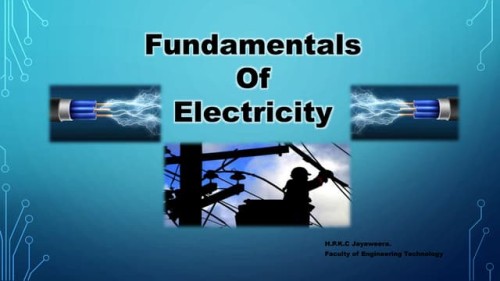Foundations of Electricity

Published 10/2025
Created by Science Academy
MP4 | Video: h264, 1280x720 | Audio: AAC, 44.1 KHz, 2 Ch
Level: Beginner | Genre: eLearning | Language: English | Duration: 81 Lectures ( 7h 50m ) | Size: 1.71 GB
A Complete Guide to Electricity Basics, DC, AC, Transformers, and Three-Phase Power Systems with Real-World Applications
What you'll learn
Electronics: How electricity works, Semiconductor theory, PN junctions, diodes, transistors, and rectifiers
DC Fundamentals: Ohm's Law, series/parallel circuits, voltage dividers, conductor resistance
DC Inductors and Capacitors: Capacitor discharge, RL circuits, time constants, Faraday's Law
AC Generation: Sine wave generation, frequency, waveform analysis
AC Principles: RL, RC, RLC circuits, resonance, power factor correction
Transformers: Transformer types, ratings, impedance, turns ratio, fault current
Three Phase Power: Wye/Delta configurations, motor connections, power calculations
Trigonometry for Electricians: Pythagoras, polar/rectangular conversions, vector analysis
Requirements
Basic math skills
No prior electrical engineering experience required
A willingness to learn and explore
Description
Foundations and Applications of Electrical Engineering is a comprehensive, hands-on course designed to take you from the basics of electronics to the intricacies of three-phase power and transformer systems. Whether you're a student, technician, or enthusiast, this course offers a structured and practical approach to understanding how electricity works and how it's applied in real-world systems.We begin with the Electronics chapter, where you'll explore the structure of atoms, covalent bonding, and the behavior of semiconductors. You'll learn how diodes and transistors function and how they form the backbone of modern electronic circuits.Next, we dive into DC Fundamentals, covering essential laws and principles such as Ohm's Law, series and parallel circuits, and voltage dividers. You'll gain the skills to analyze and troubleshoot basic electrical circuits with confidence.In DC Inductors and Capacitors, we explore energy storage, time constants, and transient behavior in RL and RC circuits—key concepts for understanding switching and filtering.The course then transitions into AC Generation, where you'll learn how alternating current is produced, how frequency is determined, and how sine waves behave in electrical systems.Building on that, AC Principles introduces you to RLC circuits, resonance, and power factor correction—critical for efficient energy use and system design.In the Transformers chapter, you'll master the theory and application of step-up and step-down transformers, multi-winding configurations, impedance calculations, and fault current analysis.Three Phase Power takes you deeper into industrial applications, teaching you how Wye and Delta systems work, how motors are connected, and how to calculate power in balanced and unbalanced systems.Finally, Trigonometry for Electricians equips you with the mathematical tools needed to analyze vectors, convert between polar and rectangular forms, and solve circuit problems with precision.By the end of this course, you will:Understand the physical and mathematical principles behind electrical systemsAnalyze and design DC and AC circuitsApply transformer theory to real-world scenariosWork confidently with three-phase power systemsUse trigonometry to solve electrical engineering problemsBe prepared for technical roles, certifications, or further studyCourse Includes90+ video lecturesLifetime accessCertificate of completionMobile and TV access
Who this course is for
Electrical engineering students
Technical school learners
Field technicians and electricians
Anyone preparing for certification exams
Curious minds interested in how electricity works
https://rapidgator.net/file/fc04e0a8a84651eb8b13d3963db7f4e9/Foundations_of_Electricity.part2.rar.html
https://rapidgator.net/file/d639408e6308d82acbb7bbcf15d7fbc0/Foundations_of_Electricity.part1.rar.html

Information
Users of Guests are not allowed to comment this publication.



